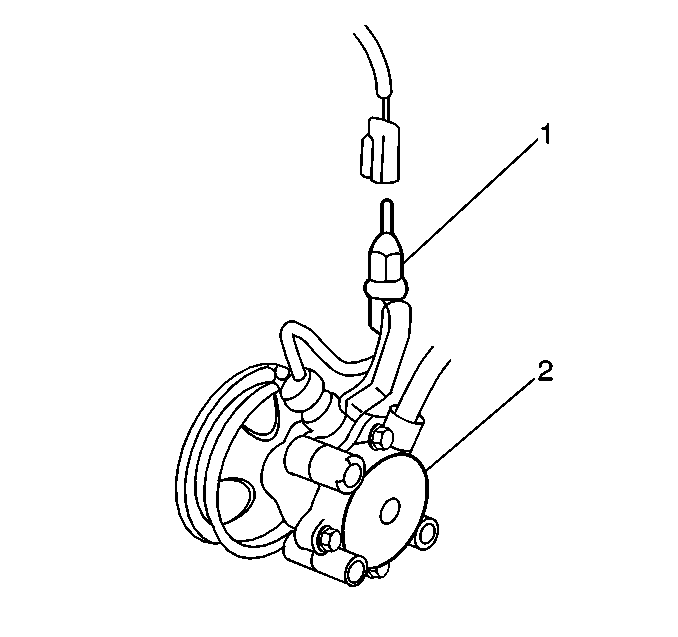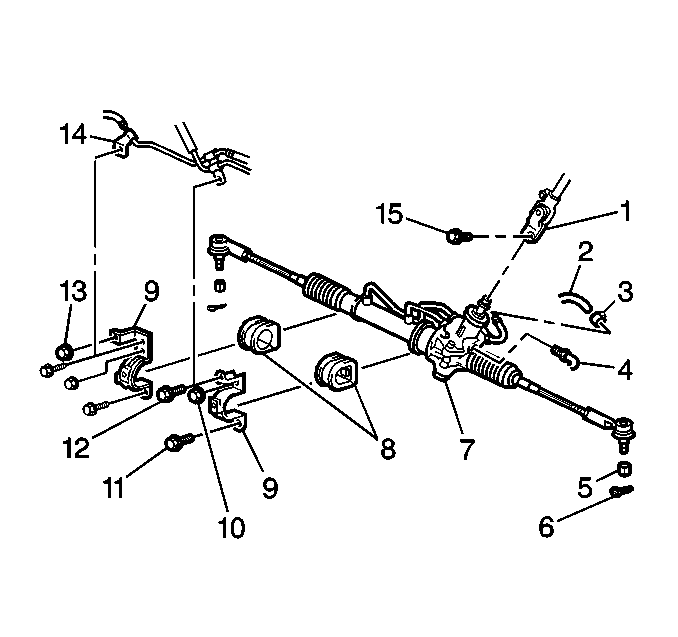Removal Procedure
- Use a siphon in order to remove the power steering fluid from the power steering fluid reservoir.
- Disconnect the power steering pressure switch electrical connector.
- Remove the power steering pressure switch (1) from the power steering gear inlet pipe.
- Remove the power steering gear inlet hose fitting and the power steering gear inlet pipe from the power steering pump (2).
- Remove the 3 bolts and the power steering gear outlet pipe heat shield.
- Remove the RH clip bolt from the intermediate outlet pipe clip (14).
- Remove the LH clip bolt (12) from the intermediate outlet pipe clip.
- Loosen the power steering gear outlet hose clamp at the intermediate outlet pipe.
- Remove the intermediate outlet pipe from the hose portion of the power steering gear outlet pipe (2).
- Remove the power steering gear inlet pipe (4) from the steering gear (7).
- Remove the power steering gear inlet pipe with clips and the intermediate outlet pipe from the vehicle.

Important: Place a drain pan under the vehicle in order to catch any escaping fluid.
Notice: Do not start the vehicle with any power steering gear inlet or outlet hoses disconnected. When disconnected, plug or cap all openings of components. Failure to do so could result in contamination or loss of power steering fluid and damage to the system.

Important: The power steering gear inlet pipe is attached to the intermediate outlet pipe. Replace the 2 pipes and the clips as an assembly.
Installation Procedure
- Install the power steering gear inlet pipe with clips and the intermediate outlet pipe to the vehicle. Secure with the LH clip bolt (12) and the RH clip bolt to the intermediate outlet pipe clip (14). DO NOT tighten the bolts.
- Install the power steering gear inlet pipe (4) to the steering gear (7).
- Install the intermediate outlet pipe to the hose portion of the power steering gear outlet pipe. Secure with the hose clamp.
- Install the power steering gear inlet pipe to the power steering pump (2). Secure with the hose fitting.
- Install the power steering pressure switch (1) to the power steering inlet pipe/hose.
- Connect the power steering pressure switch electrical connector.
- Tighten the 2 pipe clip bolts.
- Install the power steering gear outlet pipe heat shield. Secure with the 3 bolts.
- Fill the power steering fluid reservoir. Refer to Checking and Adding Power Steering Fluid .
- Bleed the power steering system. Refer to Power Steering System Bleeding .

Notice: The inlet and outlet hoses must not be twisted during installation. Do not bend or distort the inlet or outlet hoses to make installation easier. Failure to follow these procedures could result in component damage.
Notice: Use the correct fastener in the correct location. Replacement fasteners must be the correct part number for that application. Fasteners requiring replacement or fasteners requiring the use of thread locking compound or sealant are identified in the service procedure. Do not use paints, lubricants, or corrosion inhibitors on fasteners or fastener joint surfaces unless specified. These coatings affect fastener torque and joint clamping force and may damage the fastener. Use the correct tightening sequence and specifications when installing fasteners in order to avoid damage to parts and systems.
Tighten
Tighten the pipe fitting to 25 N·m (18 lb ft).

Tighten
Tighten the hose fitting to 54 N·m (40 lb ft).
Tighten
Tighten the power steering pressure switch to 21 N·m (15 lb ft).
Tighten
Tighten the bolts to 5.4 N·m (48 lb in).
Tighten
Tighten the bolts to 5.4 N·m (48 lb in).
Notice: When adding fluid or making a complete fluid change, always use the proper power steering fluid. Failure to use the proper fluid will cause hose and seal damage and fluid leaks.
Notice: If the power steering system has been serviced, an accurate fluid level reading cannot be obtained unless air is bled from the steering system. The air in the fluid may cause pump cavitation noise and may cause pump damage over a period of time.
